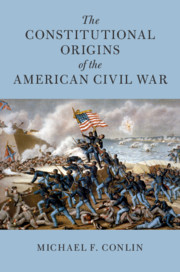Book contents
- The Constitutional Origins of the American Civil War
- Cambridge Historical Studies in American Law and Society
- The Constitutional Origins of the American Civil War
- Copyright page
- Dedication
- Contents
- Figures
- Tables
- Preface
- Acknowledgments
- Abbreviations
- Terms
- 1 The Original Intent of the Slaveholding Founders
- 2 Two Constitutional Wrongs Did Not Guarantee a Constitutional Right
- 3 The Tyranny of the Northern Majority
- 4 The Spirit of 1787
- 5 The Constitutional Right of Secession
- Epilogue
- Charts Showing the Authors of Manuscript Sources Cited
- Charts Showing the South’s Minority Status in the Federal Government
- Select Bibliography
- Index
2 - Two Constitutional Wrongs Did Not Guarantee a Constitutional Right
Published online by Cambridge University Press: 28 June 2019
- The Constitutional Origins of the American Civil War
- Cambridge Historical Studies in American Law and Society
- The Constitutional Origins of the American Civil War
- Copyright page
- Dedication
- Contents
- Figures
- Tables
- Preface
- Acknowledgments
- Abbreviations
- Terms
- 1 The Original Intent of the Slaveholding Founders
- 2 Two Constitutional Wrongs Did Not Guarantee a Constitutional Right
- 3 The Tyranny of the Northern Majority
- 4 The Spirit of 1787
- 5 The Constitutional Right of Secession
- Epilogue
- Charts Showing the Authors of Manuscript Sources Cited
- Charts Showing the South’s Minority Status in the Federal Government
- Select Bibliography
- Index
Summary
Chapter 2 focuses on the international slave trade clause and the fugitive slave clause. The Constitution permitted Americans to ply that “infamous traffic” for two decades, but the Founders hoped that American slavery would end after the slave trade ceased to supply new chattels. Instead, the American slave population expanded. In the 1850s, a small band of fire-eaters tried to overturn the federal ban on the slave trade. In a couple of notorious cases, Southern juries refused to convict slave traders despite overwhelming evidence of their guilt. At the same time that these slave traders brought the slave trade clause to the fore, enslaved persons did the same for the fugitive slave clause, making it the most contentious of the Constitution’s compromises over slavery. While all Southerners and many Northerners agreed that the return of fugitive slaves was a constitutional duty, some abolitionists shirked this obligation and a tiny minority actively flouted the law. Northern juries declined to convict slave rescuers. The actions of the slave rescuers and the slave traders called into question the commitment of the North and the South to the rule of constitutional law.
Keywords
- Type
- Chapter
- Information
- The Constitutional Origins of the American Civil War , pp. 40 - 81Publisher: Cambridge University PressPrint publication year: 2019

